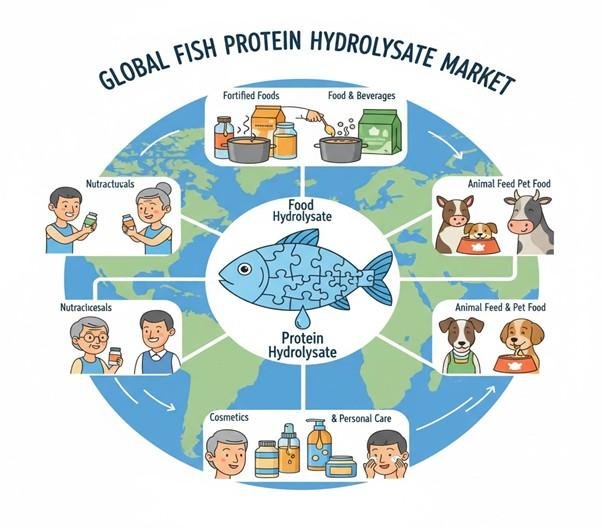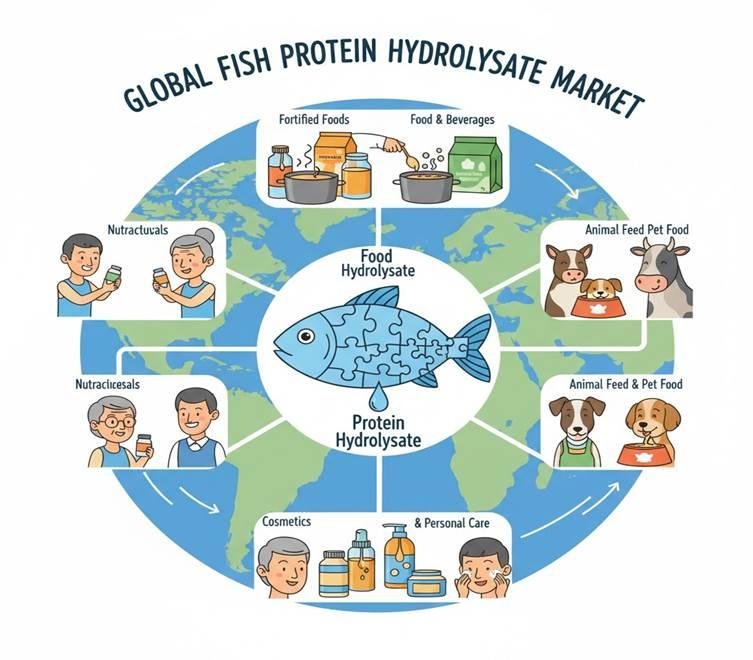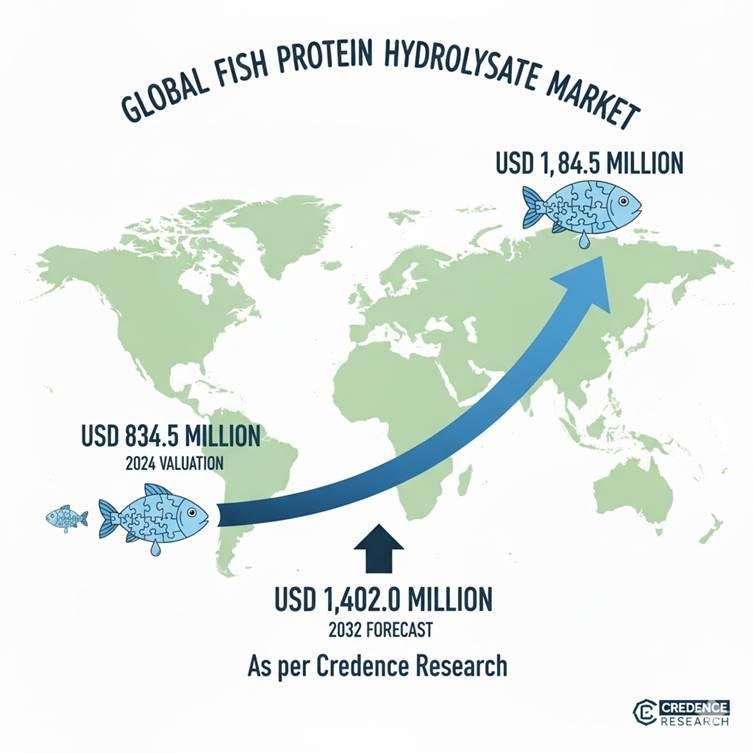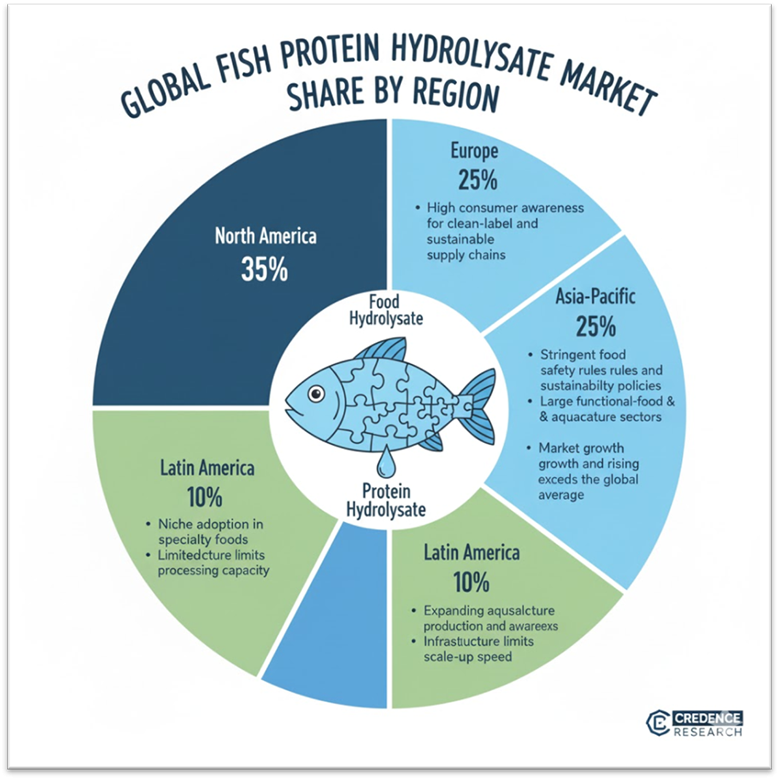Fish Protein Hydrolysate Market Overview: Regional Insights and Demand Drivers


Market Overview
The Fish Protein Hydrolysate Market was valued at USD 834.5 million in 2024 and is forecast to reach USD 1,402.0 million by 2032, growing at a CAGR of 6.7%, as per Credence Research. Demand for functional foods, natural additives, and sustainable protein options drives uptake in food, nutraceutical, and animal feed applications. Rising investments in aquaculture, expanding pet-food demand, and improvements in hydrolysis technology further support market expansion.
Source: https://www.credenceresearch.com/report/fish-protein-hydrolysate-market

Market Drivers
Rising Demand for Functional Foods and Natural Additives
The Fish Protein Hydrolysate Market benefits from growing consumer preference for bioavailable, natural proteins in supplements and foods. It supplies high amino acid content that supports nutrition formulations and improves digestibility in animal feed. Manufacturers expand supply to meet demand for clean-label ingredients and to replace less sustainable protein sources. Credence notes technological improvements that raise yields and reduce costs, supporting wider commercial adoption.
Aquaculture Growth and Pet-Food Expansion
Investment in aquaculture and stronger pet-food markets create steady demand for protein-rich feed ingredients. It serves as a nutrient-dense, cost-effective feed additive that improves growth performance and health metrics in livestock and aquaculture species. Producers scale capacity to capture this demand while formulators prefer hydrolysates for functional benefits in premium pet diets.
Market Trends and Opportunities
Shift Toward Sustainable, Upcycled Ingredients
Producers convert fish-processing by-products into hydrolysates, reducing waste and lowering raw-material costs. It aligns with corporate sustainability targets and regulatory pressure to improve circularity in seafood value chains. Brands exploit this story to differentiate premium functional foods and nutraceutical products in developed markets.
Product Innovation for High-Value Niches
Companies develop tailored hydrolysates for sports nutrition, clinical nutrition, and specialty aquafeeds. It allows premium pricing and stronger margins when applied to performance supplements and therapeutic formulations. Partnerships between ingredient suppliers and formulators open route-to-market for niche applications and novel product launches.
Market Challenges
Raw-Material Variability and Supply Constraints
The Fish Protein Hydrolysate Market faces inconsistent raw-material quality across regions that affects peptide profile and functionality. It forces producers to invest in quality control and blending strategies to meet food- and feed-grade specifications. Price volatility for fish by-products increases cost pressure on smaller processors and compresses margins.
Regulatory and Perception Barriers
Regulatory requirements for novel ingredients and differing regional standards slow product approvals and add compliance costs. It must overcome consumer perception challenges around seafood-derived additives in certain markets. Companies invest in safety data, clinical evidence, and transparent sourcing to build trust and accelerate adoption.
Key Players
- Sopropeche (SOPROPECHE)
- Diana Group (Diana Aqua / Symrise)
- Copalis Sea Solutions
- Scanbio Marine Group (Scanbio)
- Bio-Marine Ingredients Ireland Ltd.
- Neptune’s Harvest
- Dramm Corporation
- Hofseth BioCare ASA
- Alaska Protein Recovery LLC
- Great Pacific BioProducts Ltd.
Regional Insights
North America 35%
High consumer awareness for clean-label and sustainable ingredients drives adoption in food, nutraceuticals, and premium pet food. Strong R&D and established supply chains support market leadership.
Europe 25%
Stringent food safety rules and sustainability policies encourage upcycling of fish waste into hydrolysates. Large functional-food and aquaculture sectors create steady commercial demand.
Asia-Pacific 25%
Rapid aquaculture growth and rising health awareness in China and India fuel demand for cost-effective feed ingredients and functional food formulations. Market growth rate exceeds the global average.
Latin America 10%
Expanding aquaculture production and regional feed demand present growth opportunities, though infrastructure and processing capacity limit scale-up speed.
Middle East & Africa 5%
Niche adoption in specialty foods and limited industrial processing capacity keep market share small; opportunities exist in targeted aquafeed projects.

Competitive Analysis
The Fish Protein Hydrolysate Market features specialist ingredient suppliers and diversified food-ingredient firms competing on quality, peptide profile, and supply reliability. Leading players such as Omega Protein, Hofseth BioCare, Diana (Symrise), and Bio-Marine focus on product development, strategic partnerships, and vertical integration to secure raw materials. It pressures smaller producers to specialize or form alliances to access larger customers and global distribution. Pricing, certification, and traceability determine contract wins.
Go-To-Market Strategy
Target tiered channels: supply standardized bulk hydrolysates to large feed and aquafeed formulators while offering premium, characterized peptides to nutraceutical and sports-nutrition brands. It requires certification, technical dossiers, and application trials to win formulators. Invest in sample programs, joint product development with co-packers, and targeted trade shows in aquaculture and nutraceutical verticals. Establish regional distribution partners in Asia-Pacific and Europe to shorten lead times. Use sustainability storytelling and upcycling credentials to command premium positioning in developed markets.
Recent Developments
- Rising investments in aquaculture drive higher commercial demand for fish-derived hydrolysates.
- Producers adopt enzymatic hydrolysis advances that improve yield and peptide control.
- Ingredient suppliers expand capacity to process fish by-products into value-added hydrolysates.
- Brands incorporate hydrolysates into premium pet-food and sports-nutrition formulations.
- Market research and certification drive greater transparency in sourcing and product labeling.
Future Outlook
Demand for nutrient-dense, sustainable protein sources will keep lifting fish protein hydrolysate adoption across food, feed, and nutraceuticals. Producers will pursue processing efficiency and peptide-tailored products for premium niches. Regional growth in Asia-Pacific and expanding pet-food consumption in developed markets will shift supply chains toward scalable by-product valorization. Increased industry collaboration on certification and clinical evidence will remove adoption barriers and support broader use in therapeutic and performance nutrition applications.
Frequently Asked Questions
What is the current market size of the Fish Protein Hydrolysate Market?
The market was valued at USD 834.5 million in 2024, per Credence Research.
What is driving market growth?
Demand for functional foods, sustainable protein, and expanding aquaculture and pet-food sectors drive growth.
Who are the major players?
Major players include Sopropeche, Diana (Symrise), Hofseth BioCare, Bio-Marine, and Neptune’s Harvest.
Which region leads the market?
North America leads with roughly 35% share; Asia-Pacific shows the fastest growth.
Source: https://www.credenceresearch.com/report/fish-protein-hydrolysate-market
- Business
- Research
- Energy
- Art
- Causes
- Tech
- Crafts
- crypto
- Dance
- Drinks
- Film
- Fitness
- Food
- Spellen
- Gardening
- Health
- Home
- Literature
- Music
- Networking
- Other
- Party
- Religion
- Shopping
- Sports
- Theater
- Wellness


